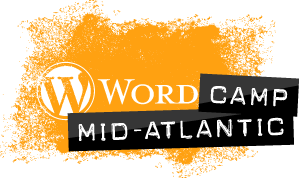 Late in 2008, while I was transitioning from life in Baltimore to life outside of Washington, D.C., I was contemplating organizing the first WordCamp event in that area. Baltimore had begun to show signs of a healthy tech community and Washington had continued to flourish as a healthy communications scene. Philadelphia, just up I-95, had a healthy design and development community and I had become somewhat familiar with that city as well.
Late in 2008, while I was transitioning from life in Baltimore to life outside of Washington, D.C., I was contemplating organizing the first WordCamp event in that area. Baltimore had begun to show signs of a healthy tech community and Washington had continued to flourish as a healthy communications scene. Philadelphia, just up I-95, had a healthy design and development community and I had become somewhat familiar with that city as well.
I made a point of making my event one that would set trends and challenge the status quo.
Mid-Atlantic
One thing I did think of early on was that I detested the trend that identified an event with a singular city, especially when there were multiple cities, all offering different, yet complementary modus operandi. I bucked the trend of identifying the event by a city, eschewing names like WordCamp DC or WordCamp Baltimore. These names, while celebratory of the city that hosts them, inherently bear the problem of inferred exclusivity.
From the very first WordCamp in the region, I challenged that designation and attempted to bring the cities together. It was called WordCamp Mid-Atlantic.
Three Cities, then Two
The original plan was to bring the three cities together in Baltimore for a WordPress event. Ideally, the result would be more collaboration and resources shared between the various communities. Ultimately, Philadelphia never bought into Mid-Atlantic (and in fact, ended up with their own successful WordCamp Philly). However, Mid-Atlantic was wildly supported by both Baltimore and DC. even garnering coverage in the Baltimore Sun business publication Maryland Daily Record.
For WordCamp Mid-Atlantic 2010, the event was geared mainly to the Washington Metro and Baltimore.
Keynotes That Challenge
In both events, I wanted to bring in someone from the WordPress leadership hierarchy as a Keynote as well as someone from outside of WordPress entirely to challenge the gathered attendees. This as quite controversial, actually. In 2009, I brought in Anil Dash, founder and former SVP at SixApart. Anil was known historically as somewhat of an antagonist, but did a wonderful job in sharing and illustrating the similarities between WordPress and SixApart who provided a competing platform. His message was one of learning from each other.
This past year, I opted to bring in Marco Tabini who has also been a frequent antagonist of WordPress. His message was one from the perspective of the PHP community and reconciling how the PHP core people could learn and help the WordPress core people, and vica versa. My inbox became a little tense in the weeks leading up to the event due to other incidents involving dissenting views about the GPL license and WordPress’ interpretation of it. Needless to say, Marco did an amazing job.
It’s Not My Baby
As most of you know, I have left the Baltimore/Washington region. As a result, this past WordCamp Mid-Atlantic was my last. People have asked me quite a lot about who I would pass the baton to. This is a tricky question because the event is not mine. It’s yours.
That said, this is not for just anyone to run. I cannot put any strings on who will run the next event but I do have the platform to voice my sentiments:
- I want to see Mid-Atlantic stay in the event. I do not want to see a fractured event where there becomes a WordCamp Baltimore and a WordCamp DC. Both cities have user groups that meet frequently. I want to see the WordCamp Mid-Atlantic event retain it’s place as a regional/local event.
- I want to see the idea of challenging (and even dissenting) opinions welcomed to the stage, like Marco… and Anil. We should not be scared of being shaken up. We should embrace it and learn from it. That said, future organizers should be sensitive as to who you have come and speak.
- Retain the unconference. One of the amazing success stories of WordCamp Mid-Atlantic 2010 was the unconference, organized by Steve Fisher. Besides the pre-scheduled and organized tracks that are familiar to conference goers, we provided a separate, yet equal unconference for ad-hoc discussion and talks. The only thing I’d change is to make it true barcamp style and make a no-powerpoint rule.
- No one organizer. I became the defacto organizer for both events. While I had varying degrees of help for both, I really became the guy for the event. This was not wise on my part. There should be an organizer in each city.
This is Baltimore’s event. This is Washington’s event. This event brilliantly integrated both communities. It really, really did. I want to see it continue (obviously with new leadership), but I want it to be with people who take it seriously and can make it better than it ever was. Put your own spin on it. Make it your own, not mine.

